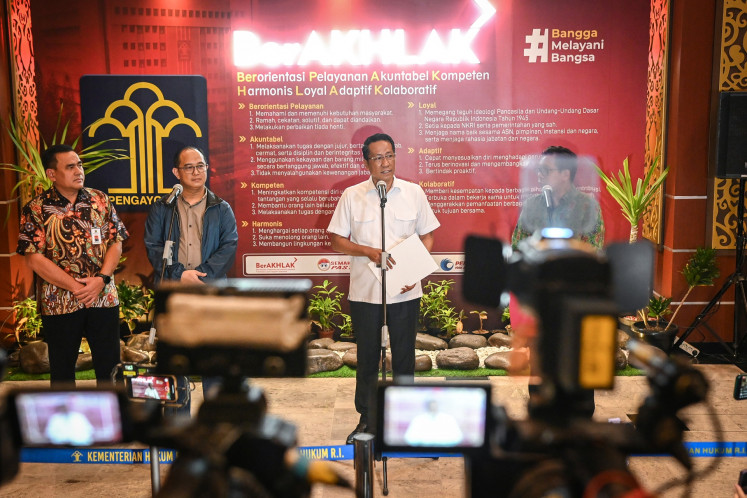Popular Reads
Top Results
Can't find what you're looking for?
View all search resultsPopular Reads
Top Results
Can't find what you're looking for?
View all search resultsExporters urged to switch to CIF contracts
The government is encouraging Indonesian exporters to use cost, insurance and freight (CIF) terms of delivery, a move that will create huge business opportunities for the local shipping industry
Change text size
Gift Premium Articles
to Anyone
T
he government is encouraging Indonesian exporters to use cost, insurance and freight (CIF) terms of delivery, a move that will create huge business opportunities for the local shipping industry.
“By introducing the CIF system, we hope exporters will be motivated to choose Indonesian vessels to transport goods overseas, and the local shipping industry will have a greater opportunity to contribute to exports,” Trade Minister Gita Wirjawan told a press conference on Wednesday in Jakarta.
Currently, most Indonesian exporters still utilize the free on board (FOB) system for transporting goods overseas, through which they pass the risk of loss to buyers who pay the cost of insurance and freight.
This has prompted foreign buyers to choose foreign vessels to carry their cargoes. In contrast, most importers already use CIF contracts by which the overseas sellers pay the insurance and freight costs.
Indonesian National Ship Owners Association (INSA) chairperson Carmelita Hartoto welcomed the move, saying that it would expand new business opportunities for local shipping firms.
The use of the FOB system has resulted in around Rp 120 trillion (US$12.4 billion) in fees going to foreign rather than local shipping companies.
“Many of our shipping firms already deliver goods overseas, but they obtain the jobs from overseas traders. With this change in the terms of trade, we hope we can directly connect with buyers,” she said during the press conference.
Carmelita said that local shipping firms were competitive compared to foreign firms in international trade activities, thanks to the elimination of the 10 percent value added tax (PPN) on freight delivery at the end of last year. The freight tax had for long eroded the competitive edge of domestic shipping firms as they also paid a 10 percent tax on fuel.
With the implementation of the cabotage principle, from 2005 to 2012 the fleet had tripled to 15,000 vessels and this should help
local players reap benefits from the use of the CIF system, Carmelita added.
Indonesian Employers Association (Apindo) chairman Sofjan Wanandi was equally supportive, saying that the introduction of the CIF system would help reduce the current account deficit. In the next six months, relevant businesses would draw up a road map to assess the readiness of the sector to apply the CIF system, Sofjan added.
The establishment of the roadmap is stipulated in a memorandum of understanding endorsing
the new CIF system signed on Wednesday by the trade minister and several business associations, including Apindo, the Indonesian Chamber of Commerce and Industry, and INSA.
“The system could perhaps be implemented initially on exports of mining products, such as coal, and commodities, particularly palm oil,” Sofjan said.
Indonesia, which is heavily reliant on commodity exports, saw its exports fall by 6.61 percent to $190.04 billion last year due to sliding commodity prices.
At the same time, imports surged by 8.2 percent to $191.67 on the back of purchases of raw materials, intermediary goods and capital goods which soared in line with surging foreign direct investment. The government anticipates exports will be stagnant this year as the global crisis continues.










